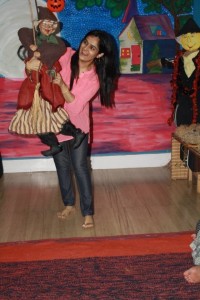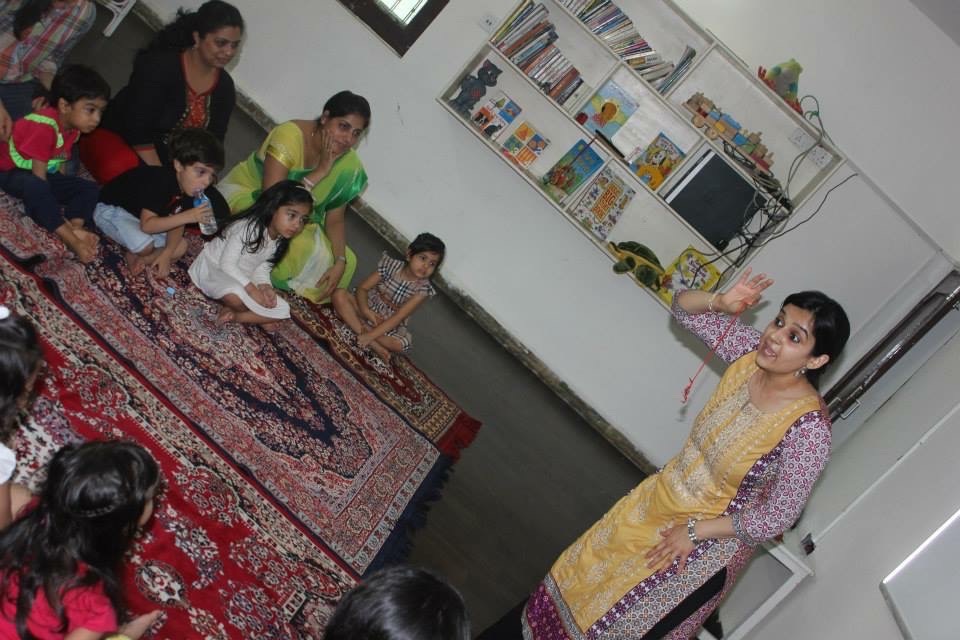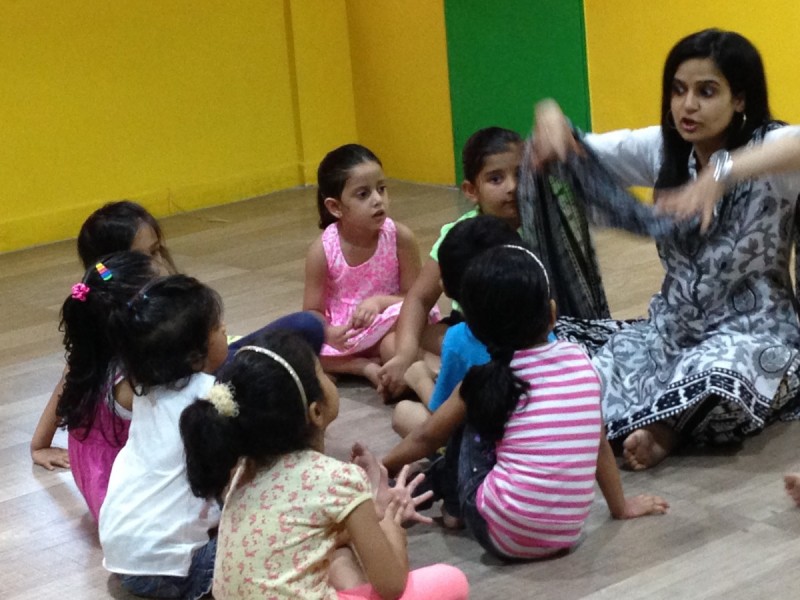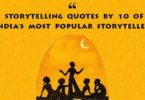Supplying a product or service in a place where there is demand for it, is fairly simple. But to create demand for something and then fulfill that demand reflects the true spirit of entrepreneurship. Rohini Vij of NutSpace did just that. Sensing the need for a space for kids, where they could learn and have fun at the same time, in Kanpur, a relatively quieter town, but not finding any, she decided to setup one herself. But did all parents feel the same way? We spoke to her about her journey to becoming a storyteller, the challenges she faced in making storytelling popular in a market used to more conventional forms of learning, and how she overcame them.
Who is Rohini – the storyteller?
Rohini the storyteller is a toddler at heart who lives by the motto that the only way to everyone’s attention is either a tantrum or a good story. She truly believes in the magic of stories and that a story told well can boost the endorphin (feel good hormone) of the listener.
She believes that she has a magical connection with her listeners, especially children, who get completely engaged in playful dramatization and active involvement during her sessions. It is that special connection with her audiences that she truly cherishes. Not only does it show their engagement and use of imagination – it demonstrates good old-fashioned fun!
What influenced you to become a storyteller?
“The wand chooses the wizard… it’s not always clear why.” – Garrick Ollivander in Harry Potter
Storytelling chose me. I had always known the power of stories but began understanding the magnitude of their power after I became a mother. I began reading stories to my son Viraaj while I was carrying him, after he was born we found immense joy in books and stories. I often found myself performing for my son and getting a fabulous response from him. His brain was growing in leaps and bounds and the stories and books we were reading seemed to be doing something magical for him. The more stories I read aloud, the more words he picked up; stories were helping build a rich network of information in his brain. That’s when this magic wand’s immense power struck me and I decided to learn more about the art of storytelling.
How was “NutSpace” born? Tell us more about it.
I was part of the corporate workforce in New Delhi for about eight years. In 2011 , my husband and I were blessed with a baby and along came a whirlwind change of shifting cities for family support. We moved to my husband’s hometown Kanpur, Uttar Pradesh. We were gradually getting past the maddening phase of sleepless nights, dirty diapers and endless rocking and feeding and one fine day, suddenly, we had nothing to do. I tried reaching out to other mums like me in Kanpur for play dates. Sadly I discovered that entertainment for children in Kanpur meant only a trip to the mall. There were no book clubs, libraries or even book stores here.
I found myself whining and cribbing about the city all the time. After one such outburst, my husband casually remarked, “Be a doer! How different are you from the others who crib about the city?” His words hit me so hard that I decided to start a storytelling space for children. There was still a problem though – No funds, no space and no guarantee that it would work. I pushed those thoughts behind, temporarily, and undertook some professional training in storytelling. On my return, I usurped half the space of my husband’s modest 450 sq. feet office and jumped headlong into making the dream called NutSpace come true.
Tell us about your academic and work background and how that helps in your storytelling activities.
I belong to the hills of Shimla, Himachal Pradesh. Schooling and graduation from prestigious institutions and an early exposure to public speaking, dramatics, creative writing and imagination gave me a strong foundation for storytelling. In fact while in school and college, it was only on the stage that I always found myself. Needless to say, the hills almost always figure in my stories. A piece of my heart still lives in Shimla.
I pursued my graduation in Honors in Economics and moved to Delhi for post graduation in Content Creation and Media Management. I specialised in Media Management and went on to work in fields like public relations, children’s publishing, corporate communication and the disability sector. My education gave me the right exposure and helped me develop a love for books, reading and dramatics. My experience in publishing brought me closer to books for children, the publishing process and gave me an opportunity to meet and interact with amazing authors. My experience in corporate communication helped me understand the process of communication, marketing and event management and finally my experience in the disability sector, where we were working towards making public infrastructure accessible for the disabled, gave me an inclusive mindset and helped me look at things from various perspectives.
Experiences shape and define the person you are. Every little experience in my life be it at school, home, work, with friends, clients or colleagues has given me stories to learn from and share with others.
Does one have to be a voracious reader to be a storyteller?
To be a good storyteller you need to read. Absorb all the words, all the hidden lessons in dramatic structure, that can only be found in books.
Those who read books tend to have a more varied range of words to express how they feel and to get their point across. This increases exponentially with the more books one reads, giving them a higher level of vocabulary to use. Books offers endless stories that can both broaden a storyteller’s understanding of the world and imagination. Just like a good book blurs the words from the pages and the reader begins living and imagining the story, a storyteller transports the listener into another world. Books help storytellers acquire these exact skills that help them elicit the right response from their listeners.
Storytelling as an activity, is pursued by kids and parents extensively in cities like Bangalore, Mumbai and Delhi NCR. How different or similar is the scenario in a smaller town like Kanpur?
In December 2012, I invited a few mothers I knew in Kanpur, for the first storytelling session, at home. I was nervous and excited. I had the same fears, because the concept of storytelling was very novel to Kanpur. Initially there was a lot of resistance. Very few understood what we were really trying to get at. Most of them didn’t want to pay money for listening to a story! The journey hasn’t been an easy one – Word of mouth and positive experiences of parents, teachers and children have helped popularize a program like ours in Kanpur.
We started with four children in January 2013 and now have more than a 100 children coming to our center. The response from schools too, for our school program, has been encouraging.
What can parents and teachers do to make storytelling more popular?
Many teachers and parents think storytelling will take time out of class hours, but it doesn’t. It is a part of the lesson, and makes the actual lesson much more powerful. Teachers and parents should be educated on incorporating the art of storytelling in the classroom and home. They should be made aware of the scientific benefits of a storytelling and how it can immensely benefit children. When a child learns through a story, the learning is permanent and even develops their concentration. The retention of stories is amazing, in my experience, even kids who are not particularly dedicated to studies, remember the stories told in the class and refer to them even when the academic year has ended.
Grown-ups are role models for children. It is from us – parents, teachers, librarians and other community members – that children learn. It indeed takes ‘a village to raise a child.’
One question we ask every storyteller – Is there any particular incident/anecdote from your sessions that you would like to share with readers?
There are so many! When I began storytelling in schools, I was once greeted at the gate by a helpful administrator who told me where I could pull up my car and unload my props. When I explained that I wasn’t carrying any, I was immediately directed to a room where I could change into my costume and do my make-up. When I informed her that I wasn’t carrying any costumes either I could see a nervous look creep on her face. I knew she was thinking, “How will this person stand in front of five hundred kids and keep them quiet for an hour by just talking?” Her nervousness made me a little unsure too and as I watched a throng of noisy children parade into the auditorium, I feared that pandemonium would break loose. To my, and the concerned administrator’s relief the moment I began telling the story all five hundred children were lost in the web of the tale.
Any advice/tips to budding storytellers?
A really good story doesn’t have to be profound, it should move the listeners, make them laugh, think, and ponder it afterwards. For a story to live forever with the listener, the storyteller needs to keep in mind only two things:
- Find your own style of storytelling: Don’t try and imitate another storyteller’s style for you may manage a decent performance but it won’t be your very best.
- Live the story you are telling: Believe in it, love it, experience it.
About NutSpace
NutSpace is an education technology company working towards building 21st century skills in children and helping them become future ready. Using a proprietary program Inventive Thinking, a unique 9-point methodology and engaging lessons planned around stories; children are prompted to use the left and right sides of their brains simultaneously. This unique style of teaching promotes thinking skills, critical & creative skills, collaborative learning, language development, public speaking skills, problem solving skills, among others.
Catering to children aged 1-14 years, NutSpace runs this program in two formats – an after school activity in NutSpace centres and an in-classroom program in collaboration with schools.
To know more about NutSpace and its activities, follow it on Facebook and Twitter.
Don’t Miss: We love storytellers as much as we love storytelling. On Tell-a-Tale, we’ve featured a lot of talented storytellers, in the past.
Are you a Storyteller? If you’re a storyteller who is actively pursuing storytelling and would like to be featured in this column, drop us a mail at contact AT tell-a-tale.com or reach out to us via Facebook.








I loved listening to the stories that are read by Rohini Vij !!! You are Gifted!!!! I try storytelling in my class too. Thanks for bringing glory to the storytelling. Love you friend.